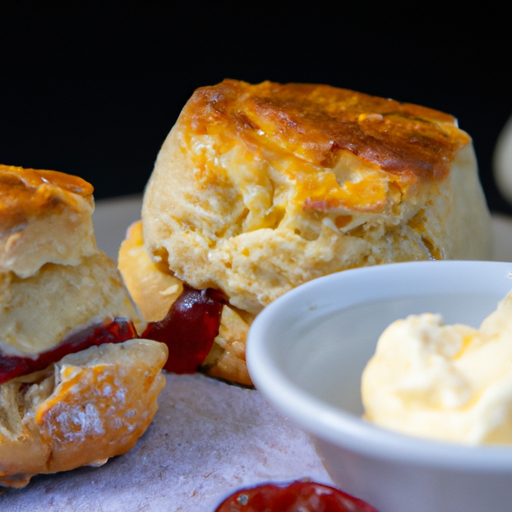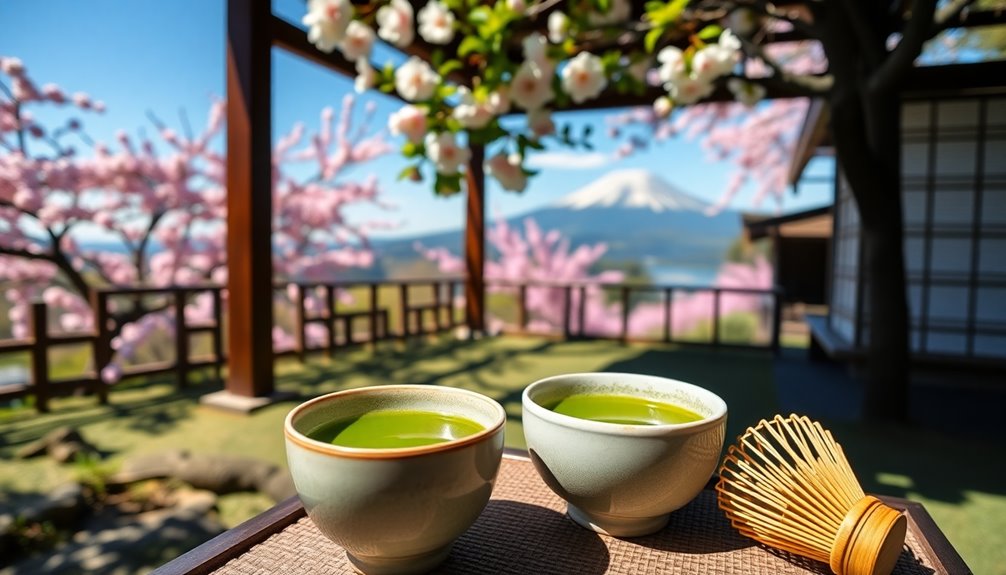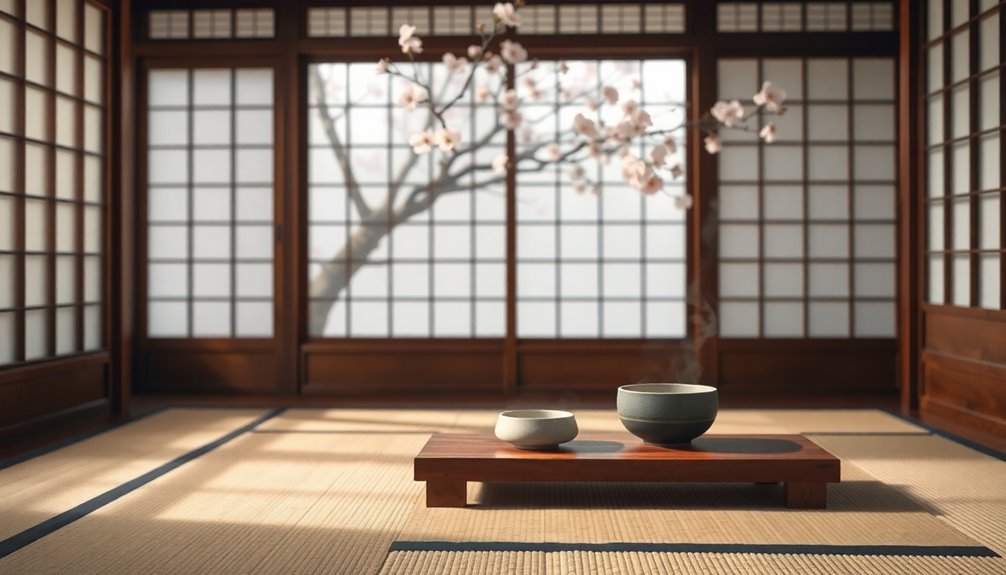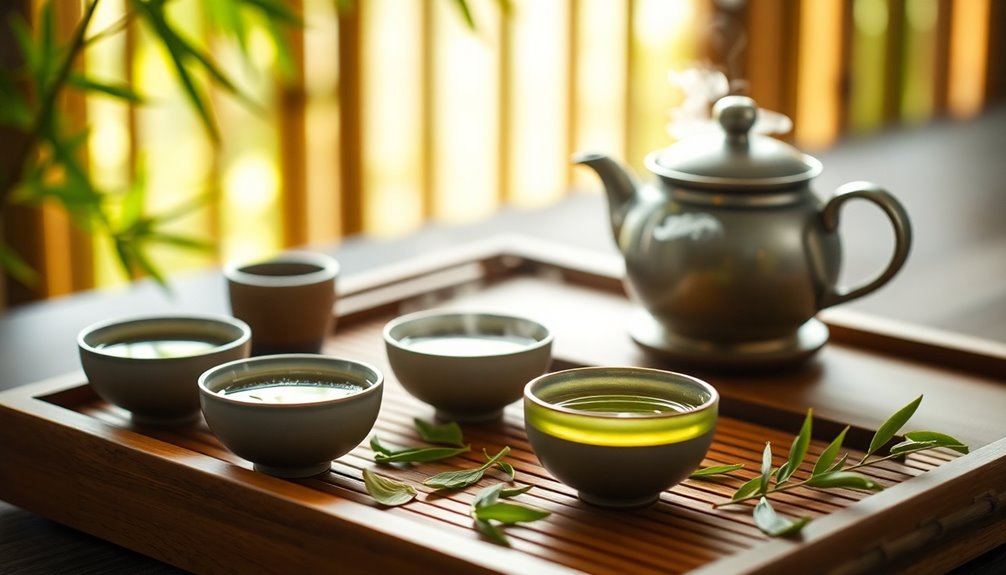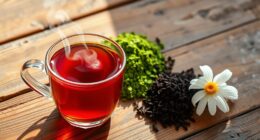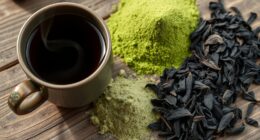Tea in Japan has a vibrant history that's sure to excite you! It started in the 9th century with Buddhist monks who celebrated its health benefits. By the 16th century, samurai embraced tea rituals, using them to connect with others and promote calmness. They enjoyed matcha and sencha, both packed with health perks like boosting focus. Over time, tea became a warm part of Japanese culture, showcasing simplicity and beauty. Today, people worldwide cherish these traditions, blending old and new. Isn't it amazing how tea has transformed? Stick around, and you'll discover even more delightful details!
Key Takeaways
- Tea was introduced in Japan by Buddhist monks in the early 9th century, emphasizing health benefits and spiritual practices.
- The formalization of the Japanese Tea Ceremony in the 16th century by Sen no Rikyū integrated mindfulness and harmony into tea culture.
- During the Muromachi period, Samurai incorporated tea rituals into their lives, reinforcing social status and camaraderie through gatherings.
- Matcha, known for its health benefits, became a symbol of focus and tranquility, particularly valued by Samurai before battles.
- Modern tea practices face cultural appropriation issues, highlighting the need for authenticity and respect for traditional Japanese tea customs.
Introduction

Tea has played a significant role in Japanese culture for over a millennium, shaping social practices and rituals. It all began in the early 9th century when Buddhist monks introduced tea to Japan. They valued it for its health benefits, and soon, samurai embraced it during the Muromachi period.
The first recorded cultivation of tea happened in 1191 at Kozanji temple, where monk Eisai planted tea seeds, highlighting tea's importance in Japanese history.
The Japanese Tea Ceremony, or Chanoyu, became formalized in the 16th century by Sen no Rikyū. This beautiful ceremony emphasizes mindfulness, harmony, and respect, reflecting Zen Buddhist principles. It's a chance for everyone to slow down and enjoy the moment together!
By the late 18th century, sencha, a loose leaf tea, became the favorite in Japan, replacing powdered matcha.
Today, modern tea culture is thriving, with unsweetened bottled teas flying off the shelves, even more popular than sugary soft drinks!
Samurai's Tea Ritual Significance

During the Muromachi period, the Samurai class embraced tea as a vital part of their culture, integrating it into their daily lives and rituals.
You'd find them enjoying tea consumption at special tea gatherings called "tocha." These events weren't just about sipping tea; they were a way to strengthen friendships and show off social status through beautiful tea ceremonies.
Zen Buddhism greatly influenced the Samurai's tea rituals. It taught them to focus on mindfulness, respect, and tranquility while preparing and enjoying their tea.
Sen no Rikyū, a key figure in tea ceremony history, set guidelines that matched the Samurai values of simplicity and humility.
The tea ceremony became a cherished social ritual for the Samurai. It offered a peaceful moment to step away from the chaos of their feudal society.
Imagine sitting quietly, sipping tea, and reflecting on life with friends around you. This practice helped them connect deeply, finding joy and calm amidst their busy worlds.
Tea's Role in Samurai Culture

For the Samurai, tea wasn't just a beverage; it was a key element of their cultural identity. During the Muromachi period, Samurai played a vital role in popularizing tea consumption, making it a part of their daily lives and cultural practices. They engaged in exciting tea competitions called "tocha," showcasing their skills in tea preparation and appreciation, which helped reinforce their status and camaraderie.
The tea ceremony, formalized by Zen monk Sen no Rikyū in the 16th century, emphasized simplicity and mindfulness. These principles matched the Samurai values of discipline and focus.
Before battles, Samurai often consumed tea to enhance concentration and provide a calming effect, which helped them think clearly in critical moments.
The aesthetic of the tea ceremony also reflects the Samurai philosophy of wabi-sabi, celebrating the beauty of imperfection. This belief shows their deeper understanding of life and nature, embracing the transient nature of existence.
Matcha's Medicinal Properties

Building on the Samurai's appreciation for tea, matcha has emerged as a significant component of Japan's tea culture, celebrated not only for its unique flavor but also for its impressive health benefits.
This special Japanese green tea is packed with powerful antioxidants, especially EGCG, which may help keep diseases at bay.
Here are some of matcha's fantastic health benefits:
- Cognitive Function: It boosts your brain power and helps you focus better, making it great for studying or working. Regular consumption of matcha may also enhance mental clarity, contributing to improved performance.
- Weight Loss: Drinking matcha can help increase fat burning and improve metabolism, which might help you shed a few extra pounds.
- Stress Reduction: Thanks to L-theanine, an amino acid in matcha, you can feel calm and relaxed without getting sleepy.
- Medicinal Value: Regularly enjoying matcha may lower your risk of heart disease and certain cancers, thanks to its high levels of antioxidants. Additionally, matcha's high antioxidant content can combat oxidative stress, enhancing overall health.
Cultural Appropriation of Tea Practices

Cultural appropriation of Japanese tea practices highlights the tension between appreciation and misunderstanding. When people adopt elements of the traditional tea ceremony without truly understanding their history or spiritual significance, it can lead to a shallow experience.
For example, matcha lattes in cafes may be tasty but often miss the Zen principles of mindfulness and simplicity that make the tea ceremony special.
Here's why it matters:
- Authenticity: The essence of the tea ceremony is deeply rooted in Japanese culture and should be respected.
- Educational programs: Workshops help bridge cultural gaps, teaching people about the philosophical underpinnings of the tea ceremony.
- Tea tourism: Visiting Japan offers a chance to enjoy traditional practices firsthand, fostering respect for the cultural heritage.
While the popularity of Japanese green tea, especially matcha, has led to commercialization, it's essential to remember the intricate rituals that accompany its preparation.
By engaging with educational programs and embracing tea tourism, you can celebrate this beautiful tradition while ensuring that its authenticity shines through.
Let's enjoy tea together, respecting its rich history!
Practical Applications

Understanding the rich history and practices surrounding Japanese tea can enhance your appreciation of its practical applications in daily life.
Tea consumption in Japan isn't just a ritual; it's a delightful way to connect with family and friends. Modern Japanese people enjoy a variety of green tea, such as Sencha and Gyokuro, each with unique flavors that suit different tastes.
Here are some practical tips for enjoying Japanese tea:
- Preparation Techniques: Use the right water temperature! For Sencha, aim for 70-80°C and steep for 1-2 minutes. This helps bring out the best flavors!
- Health Benefits of Tea: Drinking Japanese green tea is great for your health! It's packed with antioxidants that can help keep you healthy and happy.
- Organic Farming Practices: Many tea plantations in Japan use organic methods, ensuring you get high-quality tea while supporting the environment.
- Additionally, traditional tea ceremonies in Japan emphasize mindfulness and respect, enhancing the overall tea experience.
Frequently Asked Questions
What Is the History of Tea in Japan?
Tea's journey in Japan began with Buddhist monks who valued its medicinal qualities. Over centuries, it evolved into a cultural staple, influencing ceremonies, traditions, and agricultural practices, ultimately becoming a cherished part of daily life.
How Have Japanese Tea Ceremonies Changed Over Time?
Japanese tea ceremonies have evolved significantly. You'll notice a shift from elaborate rituals to a focus on simplicity and mindfulness, embracing wabi-sabi aesthetics while incorporating modern elements, making them more accessible and reflective of contemporary values.
What Tea Did Samurais Drink?
Samurais primarily drank matcha, a powdered green tea, which they cherished for its flavor and cultural significance. Over time, they also embraced sencha, a loose leaf tea, reflecting their evolving tastes and traditions.
Why Is Tea an Important Part of the Culture and Everyday Life of Japanese People?
Tea's an essential part of Japanese culture because it embodies harmony and respect. You embrace it daily, enjoying its flavors and rituals, fostering connections with others while appreciating its deep-rooted significance in your society.
Conclusion
In conclusion, tea in Japan has an amazing history that connects samurai warriors to our modern lives. From the calming matcha rituals to the shared moments of joy over a warm cup, tea brings people together! It's not just a drink; it's a celebration of culture and friendship. So, next time you sip your tea, remember the rich traditions behind it and enjoy every delightful drop with your loved ones! Cheers to tea time!


